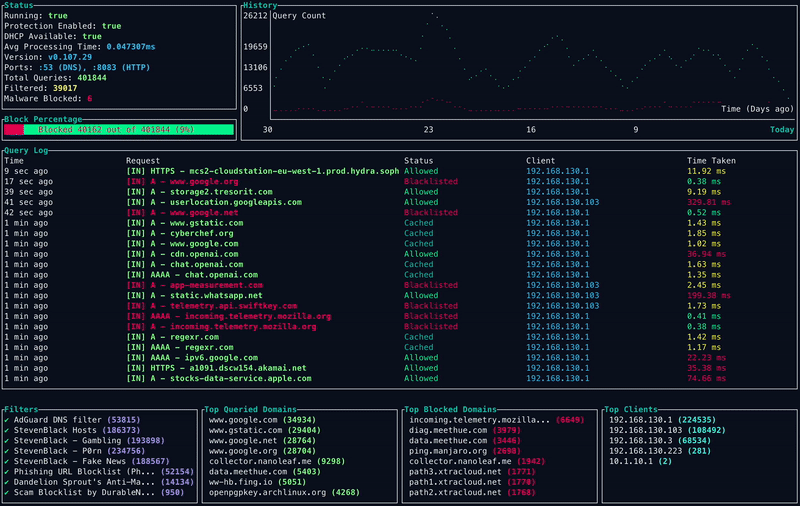AdGuardian
Terminal-based, real-time traffic monitoring and statistics for your AdGuard Home instance
 View on GitHub
View on GitHub

Free & Open Source | Licensed under MIT © 2023 Alicia Sykes
AdGuardian-Term
Terminal-based, real-time traffic monitoring and statistics for your AdGuard Home instance

About
AdGuardian Terminal Eddition - Keep an eye on your traffic, with this (unofficial) buddy for your AdGuard Home instance

Features
- Real-time Query Monitoring: Fetches and displays all DNS queries in real time, letting you see exactly what's happening on your network at any given moment
- Block and Allow Stats: Get a quick overview of the number of queries that have been allowed, filtered or blocked by AdGuard
- Historical Query Counts: Analyze network activity over time with historical query count data. This lets you track trends and spot any unusual activity
- Filter Lists: AdGuardian displays your active filter lists, showing which ones are doing the most work
- Top Domain Statistics: See which domains are getting the most queries (blocked, allowed and otherwise) in your network
- Easy and Lightweight: AdGuardian can be run either with a super tiny Docker image, or directly with the zero-dependency executable
- Good and Safe: Written in Rust and unit tested, the app runs locally with no external requests, and (of course) it's fully open source
About AdGuard
AdGuard Home is a free and open source self-hosted (or managed) network-wide ad + tracker blocker. It operates as a DNS server that re-routes tracking domains to a "black hole", thus preventing your devices from connecting to those servers. It makes your internet, faster, safer and gives you a bunch of useful features, like encrypted DNS (DoH, DoT, DNSCrypt), parental controls, blocking of malware / phishing, per-device configs, custom DNS rules, etc.
Contents
Getting Started
There are several options for running...
Docker
docker run -it lissy93/adguardian
You may also pass in your AdGuard info with env vars (using
-e), see the Configuring section for an example, and list of availible config params.
If you experience issues with DockerHub, or would rather use a different registry, the image is also available via GHCR - just replace the image name with:ghcr.io/lissy93/adguardian. Alternatively, if you'd like to build it yourself from source, you can do so withdocker buildx build -t adguardian .then run it withdocker run -it adguardian.
Executable
curl -o adguardian https://github.com/Lissy93/AdGuardian-Term/releases/latest/download/adguardian-linux && \
chmod +x adguardian && \
./adguardian
In the above example, don't forget to update the URL to download the latest stable version for your operating system
You may also just head over the the Releases tab, download the latest executable, and double-click on it to run
Install from Crates.io
cargo install adguardian
adguardian
AdGuardian is published as a crate to crates.io/crates/adguardian. So providing you've got Cargo installed, you can pull the binary directly, and then execute it as above. Again, see the Configuring section below for how to pass in your AdGuard info.
Build from Source
git clone [email protected]:Lissy93/AdGuardian-Term.git && \
cd AdGuardian-Term && \
make
You'll need
git,cargoandmake(see here for installation notes). You can also run the cargo commands defined in the Makefile directly, e.g.cargo run
Scoop
scoop install extras/adguardian
For Windows users, AdGuardian is availible via the Scoop package manager, as part of the
extrasbucket - You'll need Scoop installed, then follow these instructions. This was contributed by @kzshantonu in ScoopInstaller/Extras#11386
AUR
paru -Syu adguardian
# or
yay -Syu adguardian
# or
git clone https://aur.archlinux.org/adguardian.git && cd adguardian && makepkg -si
One-Liner
bash <(curl -sL https://raw.githubusercontent.com/Lissy93/AdGuardian-Term/main/quick-start.sh)
This will run the quick-start.sh Bash script, which downloads and executes the latest binary for your system type. Be sure to read and understand the file first
Not sure which method to choose?
- Docker is the easiest but needs to be installed, and adds a bit of overhead (12Mb, to be precise)
- Whereas using the executable won't require any additional dependencies
- If you've got Rust installed, fetching from crates.io will also be both easy and performant
- If your system architecture isn't supported you'll need to build from source, as you also will if you wish to run a fork or make amendments to the code
Configuring
The app requires the details of an AdGuard instance to connect to. This info can be provided either as environmental variables, or passed in as flag parameters. If any of these fields are missing or incomplete, you'll be prompted to enter a value once the app starts.
The following params are accepted:
ADGUARD_IP/--adguard-ip- The IP address of your local AdGuard Home instanceADGUARD_PORT/--adguard-port- The port that AdGuard is running onADGUARD_USERNAME/--adguard-username- An AdGuard Home usernameADGUARD_PASSWORD/--adguard-password- An AdGuard Home password
There's also some additional optional environment variables that you may set:
ADGUARD_PROTOCOL- The protocol to use when connecting to AdGuard (defaults tohttp)ADGUARD_UPDATE_INTERVAL- The rate at which to refresh the UI in seconds (defaults to2)
Examples
With Flags
adguardian -- \
--adguard-ip "192.168.180.1" \
--adguard-port "3000" \
--adguard-username "admin" \
--adguard-password "bobs-your-uncle"
With Env Vars
ADGUARD_IP="192.168.180.1" ADGUARD_PORT="3000" ADGUARD_USERNAME="admin" ADGUARD_PASSWORD="bobs-your-uncle" adguardian
In Docker
docker run \
-e "ADGUARD_IP=192.168.180.1" \
-e "ADGUARD_PORT=3000" \
-e "ADGUARD_USERNAME=admin" \
-e "ADGUARD_PASSWORD=bobs-your-uncle" \
-it lissy93/adguardian
Web Mode
The terminal dashboard can also be viewed via a browser, thanks to ttyd.
AdGuardian is fully compatible with ttyd, so once you've installed it, you can just precede your run command with ttyd.
E.g. ttyd docker run -it lissy93/adguardian or ttyd adguardian
You can also just use the ttyd-Dockerfile, this will build the latest AdGuardian-Term from github and the latest ttyd and compiles both together into a single dockerfile. So you don't have to install ttyd on the host, due to security reasons.
This might be useful for embedding into another app or dashboard (like Dashy 😉 - although Dashy already has an AdGuard widget!)

Another great option is gotty, which works in a similar way. Note that if you want to allow user input, you'll need to pass the -w option.
You can also combine this with a service like ngrok to forward the port, and access the dashboard from anywhere. But be careful to apply the correct access controls!
Another fun idea, could be to display it on a little screen, either atatched or SSH'd into your AdGuard box.

Development
Prerequisites
You'll need Rust installed. Run: curl --proto '=https' --tlsv1.2 -sSf https://sh.rustup.rs | sh - see the installation docs. You'll also need Git, if you don't already have it.
Then clone the repo, and cd into it, with: git clone [email protected]:Lissy93/AdGuardian-Term.git && cd AdGuardian-Term
You can view the full list of availible project commands in the Makefile
Run
To build and run the project for development, run cargo run
Technical Docs
The documentation can be viewed at: lissy93.github.io/AdGuardian-Term
Testing and Quality
cargo test- Run unit testscargo check- Ensure app is compilablecargo bench- Execute benchmarkscargo clippy- Analyse areas for improvementcargo doc- Generate the documentation
Building
Once your finished developing, you can build the project for production with: cargo build --release
The binaries for your system will then be available in the ./target/release/ directory of the project.
You can execute this directly, e.g. by running ./target/release/adguardian (add .exe if on Windows)
CI / CD
The testing, building, and publishing of the app is done with GitHub Actions. Below is an outline + current status of each workflow.
Credits
Contributors
|
Alicia Sykes |
Alicia Bot |
Tobias |
Christoph |
Null |
Sponsors
Dependencies
This project was made possible by the maintainers of the following dependencies
- anyhow - Error objecr for idiomatic error handling
- base64 - Base 64 encoding
- chrono - Date + time parsing and manipulating
- colored - Handling of terminal colors
- crossterm - Term manipulation for kb + mouse events
- futures - Extension of futures for async computation
- reqwest - HTTP client
- serde - Decerilization of JSON responses
- tokio - Improved futures
- tui-rs - Terminal graphing
Mirror
A mirror of this repository is published at: codeberg.org/alicia/adguardian
Alterntives
This project was heavily inspired by PADD - terminal status for Pi-Hole users. If you're running Pi-Hole instead of AdGuard, I highly reccomend you check that out, as it's awesome.
Other developers have built similar AdGuard Home monitoring programs for mobile, including:
- iOS app: AdGuard Home Remote by RocketScience IT
- Android app: AdGuard Home Manager by JGeek00
If you're looking for more AdGuard add-ons, then check this section of their repo.
If you're running Dashy (a Homelab Dashboard app (which I am the author of)), then there's also 4 AdGuard Home Widgets.
Before I created this, I first built the same product in Go Lang. You can view that here - it's fully functional, but not as good as the Rust version (There were some valuable lessons that I learnt the hard way about choosing the right tech stack).
Contributing
Contributions of any kind are very welcome (and would be much appreciated!) For Code of Conduct, see Contributor Convent. For project setup, see the Development section.
New here?
To get started, fork the repo, make your changes, add, commit and push the code, then come back here to open a pull request. If you're new to GitHub or open source, this tutorial may help, I've also put some beginner guides together at git-into-open-source - but feel free to reach out if you need any support.
Not a coder?
You can support the project in other ways too, drop us a star, consider sponsoring us on GitHub, share within your network, and report any bugs you come across.
License
Lissy93/AdGuardian-Term is licensed under MIT © Alicia Sykes 2023.
For information, see TLDR Legal > MIT
Expand License
The MIT License (MIT)
Copyright (c) Alicia Sykes <[email protected]>
Permission is hereby granted, free of charge, to any person obtaining a copy
of this software and associated documentation files (the "Software"), to deal
in the Software without restriction, including without limitation the rights
to use, copy, modify, merge, publish, distribute, sub-license, and/or sell
copies of the Software, and to permit persons to whom the Software is furnished
to do so, subject to the following conditions:
The above copyright notice and this permission notice shall be included install
copies or substantial portions of the Software.
THE SOFTWARE IS PROVIDED "AS IS", WITHOUT WARRANTY OF ANY KIND, EXPRESS OR IMPLIED,
INCLUDING BUT NOT LIMITED TO THE WARRANTIES OF MERCHANT ABILITY, FITNESS FOR A
PARTICULAR PURPOSE AND NON INFRINGEMENT. IN NO EVENT SHALL THE AUTHORS OR COPYRIGHT
HOLDERS BE LIABLE FOR ANY CLAIM, DAMAGES OR OTHER LIABILITY, WHETHER IN AN ACTION
OF CONTRACT, TORT OR OTHERWISE, ARISING FROM, OUT OF OR IN CONNECTION WITH THE
SOFTWARE OR THE USE OR OTHER DEALINGS IN THE SOFTWARE.
© Alicia Sykes 2023
Licensed under MIT

Thanks for visiting :)